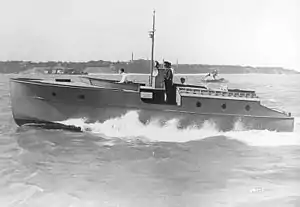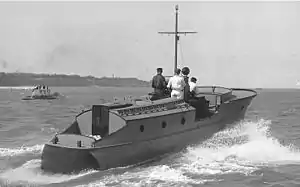 | |
| History | |
|---|---|
| Name | USS Terrier |
| Namesake | Previous name retained |
| Builder | Great Lakes Boat Building Corporation, Milwaukee, Wisconsin |
| Completed | 1917 |
| Acquired | Officially 19 July 1917 |
| Commissioned | 1 June 1917 |
| Stricken | 10 March 1919 |
| Fate | Returned to owner 10 March 1919 |
| Notes | Operated as private motorboat Terrier 1917 and from 1919 |
| General characteristics | |
| Type | Patrol vessel |
| Length | 40 ft (12 m) |
| Beam | 9 ft (2.7 m) |
| Draft | 5 ft 7 in (1.70 m) forward |
| Speed | 22 miles per hour[1] |
| Complement | 9 |
| Armament |
|
The second USS Terrier (SP-960) was a United States Navy patrol vessel in commission from 1917 to 1919.
Terrier was built as a private motorboat of the same name in 1917 for Paul Armstrong of Chicago, Illinois, by the Great Lakes Boat Building Corporation at Milwaukee, Wisconsin. Armstrong had her built to a design intended specifically for naval patrol work in connection with the Preparedness Movement, and turned her over to the Navy in 1917 for use as a section patrol boat during World War I. She was commissioned on 1 June 1917 as USS Terrier (SP-960), although her formal acquisition from Armstrong did not take place until 19 July 1917.
Assigned to the 9th Naval District, Terrier patrolled Lake Michigan for the rest of World War I.
Terrier was stricken from the Navy List on 10 March 1919 and returned to Armstrong the same day.
Notes
- ↑ The Dictionary of American Naval Fighting Ships and NavSource Online give Terrier's speed as 22 miles per hour, implying statute miles per hour, an unusual unit of measure for the speed of a watercraft. It is possible that her speed actually was 22 knots. If 22 statute miles per hour is accurate, the equivalent in knots is 19.
References
- This article incorporates text from the public domain Dictionary of American Naval Fighting Ships. The entry can be found here.
- Department of the Navy Naval History and Heritage Command Online Library of Selected Images: Civilian Ships: Terrier (American Motor Boat, circa 1917). Served as USS Terrier (SP-960) in 1917-1919
- NavSource Online: Section Patrol Craft Photo Archive Terrier (SP 960)
